Transforming the nature of comedy and animation to create perhaps the most successful TV show of all time isn’t quite as glamorous or exciting as you might imagine. The Simpsons’ writers spent long days in the same room, sweating over jokes and storylines. The animators worked overtime to bring bigger and more ambitious episodes to life. Being funny was sometimes a chore, but those involved had a sense that they were working on something special.
Advertisement
By season four, The Simpsons had entered what many now consider to be its golden age (although, at the time there were already suggestions that it was losing its way). “Marge vs. the Monorail” (S4, E12), with its grand scale, silly asides and abundance of absurdist humour, represented a stark departure from the show’s established formula. While initial reactions were mixed, it’s now widely regarded as one of The Simpsons’ best-ever episodes.With a script by Conan O’Brien – then an energetic young comedy writer – and meticulous yet joyful direction by Rich Moore – who subsequently won an Oscar for Best Animated Feature with Zootopia – the result is a wild ride, as charming conman Lyle Lanley convinces Springfield to spend $3 million on a monorail through the power of song alone. Disaster ensues until Homer saves the day, with the help of Lard Lad Donuts.Featuring parodies of The Flintstones, The Music Man and several disaster movies, as well as a family of possums and some memorable lines from guest star Leonard Nimoy, “Marge vs. the Monorail” helped to chart a new course for The Simpsons. It also succeeded in putting Brockway, Ogdenville and North Haverbrook on the map. Twenty-seven years on from when it first aired, five key figures involved in making the episode shared their memories of creating a classic.
ORIGINS
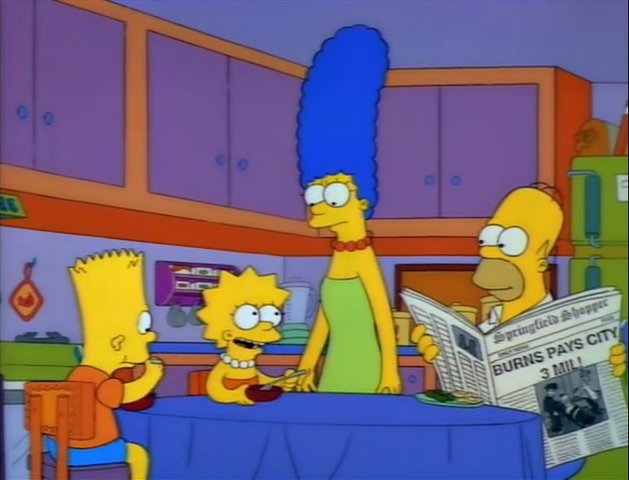
Mike Reiss, Showrunner: Every year, all the writers would go off on a retreat, and it was a day where we had the undivided attention of Matt Groening and James L. Brooks. We would prepare little pitches. Conan was brand new at the job and he came in with three ideas. He tested them on Al Jean [Showrunner] and me first.
Advertisement
When we heard about the monorail episode, we said, “We don’t think Jim Brooks is going to like this. We think it’s too weird, so put it in your back pocket and don’t pitch it unless you’ve pitched your other two ideas already.” It shows that we didn’t know anything, because Brooks loved the idea. Conan sold three script ideas at that meeting – his first meeting – and I don’t think anyone had ever done that, before or since.Jeff Martin, Producer: [Conan] hit the ground running. He happened to have the office right next to mine. Usually we were in the writers’ room, but when you go off and write your first draft you go to your little bungalow office. I remember him writing the monorail song and he knew he had something good. He was very tickled by what he was coming up with. He would pop into my office with a couplet, like Wiggum saying, “The ring came off my pudding can / Take my pen knife, my good man.” He was narrating that to me as he wrote it.Mike Reiss: The writers’ room was always very funny and creative and energised, but it was such hard work. It was very long hours. Al Jean and I were running the show and we were working 100 hours a week. Even though they liked the job and loved the show, everybody left as soon as they could. Nobody could keep it up at the pace that we were going.Josh Weinstein, Story Editor: Working with Conan was like watching a ten-hour episode of his show, every day, in the writers’ room. All the other writers are hilarious, but most of them are quiet and thoughtful, whereas Conan’s just out there. Although he’s crazy, he’s a super anal writer. Some first drafts require a lot of rewriting, but his first draft was excellent.
Advertisement
Jeff Martin: My personal memory of doing The Simpsons is 98 percent sitting in one room, in one spot on a couch, for an average of 11 hours a day. Eating my lunch and my dinner in that room, and watching a bunch of relatively young men age quickly and put on weight.
HOW ‘THE SIMPSONS’ WAS ALREADY CHANGING

Josh Weinstein: Season three and season four are kind of the ultimate seasons. That’s when they got the formula right. The first couple of seasons are brilliant, but they’re a little slow and there aren’t as many jokes. I think by the third season they’d figured out the perfect balance of story, characters and jokes. By season four, the show was operating on all pistons.Mike Reiss: By the fourth season, the three executive producers left us alone. We barely saw Matt Groening, Sam Simon and James L. Brooks. They’d established The Simpsons and set the tone for the show, and then they were all off developing new things. We couldn’t have made the show without them, but it was nice not to have this extra layer of people overseeing the project. Al and I just got to do the show, with the staff, that we wanted to do.David Silverman, Supervising Director: We were getting better at our craft certainly, but it was still those years of exploration, and it felt like every episode was trying something different. We were just adding to the whole structure of Springfield – the world and the cast of characters.
Advertisement
Rich Moore, Director: For me as a director, “Marge vs. The Monorail” was a real turning point, because it was the beginning of these big spectacle episodes. We had a musical number every now and then, but the stories had been more intimate. Very domestic and around the house. Here comes this one that has a full-blown disaster movie ending.Mike Reiss: The show was slowly drifting into surrealism. At the end of that episode, when Leonard Nimoy beams out of there like on Star Trek, I remember Jeff Martin said he was thinking, ‘Alright, I guess we’re doing this now. The Simpsons has decided it can break physical laws.’ It wasn’t a vision we had for the show or anything like that, Al and I were just trying to get laughs. The show had to get a little bigger and weirder all the time for it to do that.Jeff Martin: There was a creed put in place early on, principally by Matt Groening and Jim Brooks, that the show would have a basic, core reality. That they were a family and essential laws of physics and gravity would be observed. I remember Matt Groening said, “We don’t do anything that sends the message that the show isn’t real.” Fine, but that’s the sort of principle that’s very hard to maintain over dozens, never mind hundreds, of episodes. Just to keep doing stories you almost have to push it a bit.Rich Moore: As a kid, The Flintstones was something that was really close to my heart, and so the fact the episode was opening with the classic intro, I was like, ‘Okay, we’re going to do this right. We’re going to dissect the opening and we’re going to get the camera moves and the timing down.’ This was pre-YouTube and the internet. I guess we were watching that opening on an old VCR and just going through and taking extensive notes. We were nuts to get it right, or at least I was.
‘THE FLINTSTONES’ OPENING
Advertisement
That kind of tells you where animation was at the time. We weren’t using computers. We were still animating on paper and pencil. There weren’t as many tools to dissect a piece of video like you have now. That was the result of a lot of hard work on the part of a lot of people.David Silverman: The Flintstones bit was actually a longer song [originally]. Al Jean and Mike Reiss came to Sam Simon and were like, ‘We’re having trouble with this opening.’ Sam Simon ends up singing, “Simpson, Homer Simpson, he’s the greatest guy in history / From the town of Springfield, he’s about to hit a chestnut tree.” He came up with that off the top of his head and that became the opening. Sometimes it’s nice when you overwrite, and suddenly it’s like, “Okay, how do we solve this?”
LYLE LANLEY

David Silverman: The only thing I can claim some credit for is helping to design Lyle Lanley. I think we were going after a little bit of the outfit of Professor Harold Hill – Robert Preston in The Music Man. A little bit in the face too, but only with the broadness of the smile. I wanted to do something graphically interesting like curls in his hair.Rich Moore: Unless it was an actor doing their own voice, we never tried to overtly caricature people. We always tried to evoke them. He was greatly influenced by Robert Preston’s character in The Music Man and a lot of it came from Phil Hartman [Voice Actor] too. I loved him. He even had that larger-than-life persona. A good part of it was from watching Phil and how he carried himself. I loved working with all his shady characters.
Advertisement
Mike Reiss: Dealing with Phil was like dealing with Lyle Lanley. He was just that guy. He was always pretending to be a glad-handing salesman. I don’t even know what he was like deeply as a person. He would come in and be enormously engaging, friendly and a pleasure to work with. He would come in to record his part and he’d nail every bit instantly. He was perfect on every line on the first take.Jeff Martin: Conan had done two seasons on Saturday Night Live and had described Hartman as absolutely the same at all times. I think, in a flattering way, he compared him to a coffee maker. Fill it with water, put in a filter and hit the button! He was always in a pleasant mood, always knew his lines and was no trouble. While he himself was very nice, I would have to say he was very good at portraying slick, empty people. I think he brought a lot of joy to it.Josh Weinstein: This was one of the first big all-Springfield episodes, where the fact that everyone in the town is so stupid that they’re taken in by this conman is really enjoyable. Phil Hartman’s performance is so full of gusto that you just really love him even though he’s a shyster.Jeff Martin: It tickles me no end, then and now, that a character could introduce himself simply by singing a song and win over the entire town. Even the smarter, sceptical characters like Lisa – all Lyle Lanley has to do is pay her a compliment and she melts too.
Advertisement
THE MONORAIL SONG
Advertisement
Josh Weinstein: I love the musical numbers and Lyle Lanley. I know it’s all based on The Music Man, but the character is so good. The musical routine is really brilliant and hilarious, and it’s one of the best Simpsons musical numbers. I think that really started people going, “We can really do funny musical numbers.”Rich Moore: I think we went over schedule and over budget. I would get into these theoretical arguments with the head of production, who would say, “We’ve got to ship this over to Korea so it gets done, because we have to meet our schedule.” I would say, “Who cares if we meet the schedule if the episode is bad?” If we have a little pad, I need that pad to put it over the top. The fact that we’re having this conversation, and the episode is held in as high regard as it is, I feel like I won that argument now. That was the right thing to do. It was worth all the pain to get it there.
SCALE
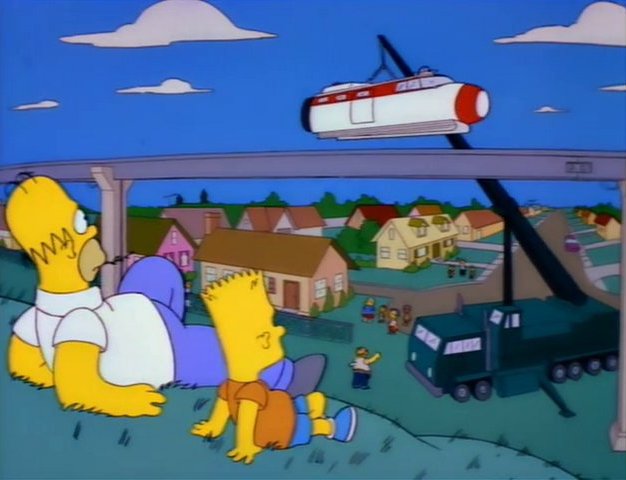
David Silverman: I remember first hearing about the idea when the script came in. It was just like, ‘Wow, this is another big show.’ I think Rich felt the same way. He was happy to direct it, but at the same time, yikes, it was a lot of work. It had a song and dance routine. It had a monorail. It had North Haverbrook. There was just a lot to design. It was a lot of extra work, but it just seemed worthwhile. It was a combination of trepidation and also thinking that this could be a lot of fun.
Advertisement
Rich Moore: David Silverman was like, ‘I don’t know how we’re going to pull this off.’ They have the means to do huge, spectacular episodes now, but at the time the staff was smaller. In TV animation you’re always behind schedule. The day you start, you’re three days behind. It was asking a lot. The challenge was huge to try to produce and direct this kind of episode in the short amount of time that we had.Josh Weinstein: In my mind it’s this episode that broke new territory. Even though it still involves the family and the town and everything like that, it’s a crazier and bigger idea that worked. I think, until then, there had been smaller stories, and this was suddenly like, ‘No, you can have the monorail come to town, and you can even have it be a musical episode, and it will work.’ I think you can say it’s probably the first modern Simpsons episode, in a way.Rich Moore: Because we had limited design resources at that time, you couldn’t just say to the background designers, “Okay, I need another building. I need this. I need that. I need the design of the Lanley Institute. It needs to look nice but it’s only in for one shot.” I can’t ask these guys to put that much time into things that are just throwaways, or to design all the locations of a new town. I was living in Pasadena, so I went around with a camera. The Lanley Institute came from a building in old town Pasadena.I just bypassed the design team and gave the photos to the background layout artist, who was a friend of mine, Nancy Kruse. The different locations in North Haverbrook were all photos taken around North Hollywood. I think at one point I was using an old polaroid to take shots quickly, because there wasn’t time to develop the film. We’d never been asked to do such big, ambitious locations before, and it put a huge strain on the design team. That was kind of my solution to it.
Advertisement
LEONARD NIMOY’S GUEST APPEARANCE
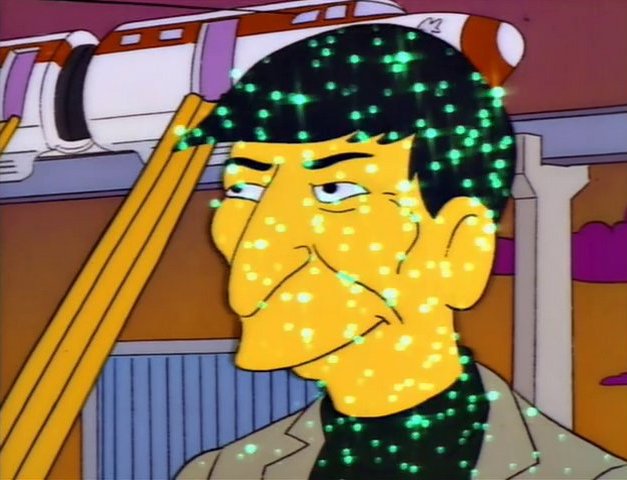
Mike Reiss: We [initially] offered the part to George Takei. He’d been on the show already and he was a great guest, a really fun guy to have around, but he was on the committee of a mass transit project in Los Angeles and he didn’t want to make fun of monorails. So, because we were already thinking Star Trek, we decided to ask Leonard Nimoy. We didn’t think we’d get him, but we did. He came in and he was game to do anything. He was game to make fun of himself.David Silverman: We were most excited about having Leonard Nimoy as a guest star. It’s Spock! We all adored Star Trek and we all adored Spock. It’s no secret that they’d gone after George Takei, but he’d requested a lot of changes because he was on the Southern California transportation board and he was worried about that.Rich Moore: We had a great character designer called Dale Hendrickson. He would really capture the celebrity in The Simpsons style like nobody else. I love that caricature of Leonard Nimoy because I’m a huge Star Trek fan. Dale was the man. He could caricature any celebrity in The Simpsons style and just really capture the essence of the person.Jeff Martin: [Nimoy] was just very gracious and easy to work with, and a good sport when we went and recorded his voice. I remember the line, “The solar eclipse, the cosmic ballet goes on.” When he got to that line he said, “Okay, I know how to deliver this one,” meaning, “I can be pompous and windy, just like you want me to be.”
Advertisement
Josh Weinstein: I really like the Leonard Nimoy stuff. Where Barney says, “You didn’t do anything,” and he says, “Didn’t I?” then he beams out. That’s one of my favourites. Somebody beaming out from Springfield hadn’t been done before. There were a lot of wall-breaking jokes that just worked because they were so funny. I think it broke new ground for joke-telling as well. It was just such a funny joke that we had to do it, but then that opened the door to more absurd jokes.Rich Moore: It’s one of those things where you’re working on it and thinking, ‘This is weird, and funny, and obtuse. I love it, and I hope everyone loves it the way I do.’ It’s very validating when you’re working in a bubble on this stuff and it’s making you crack up, and you hope that people see it the same way that you do. I just love that kind of thing, and to know that it’s become so well-known, with all the memes and the references, is really satisfying as an artist and a director.
DISASTER FILM-INSPIRED CLIMAX
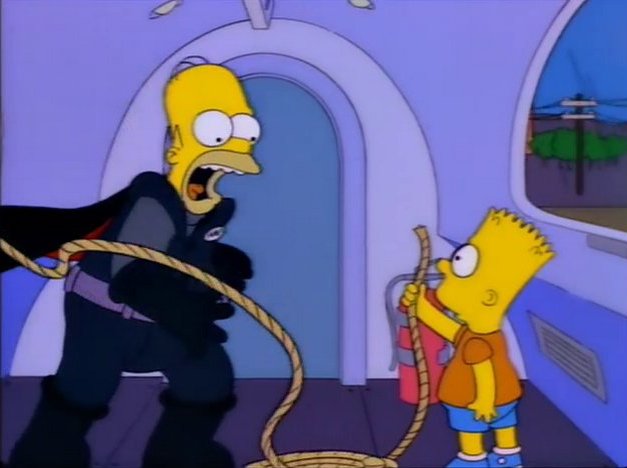
Mike Reiss: I was speaking at an animation festival in Slovakia and they said: “Bring an episode we can show on the big screen.” I brought the monorail episode. It was the first time I’d seen it in 20 years and I went, ‘Holy crap, this thing’s good!’ On the big screen it doesn’t even play like a Simpsons episode, it plays like a movie. A lot of credit goes to Rich Moore, who directed it like a movie. The climax of it, with the monorail tearing through town, as crazy and silly as it is, is very exciting and dynamic.
Advertisement
Rich Moore: It was all done with coverage. It was scenes out of order. It was really just guesswork. “I’m going to need this kind of shot – I’m going to need it going away from the camera, I’m going to need it coming towards the camera, dragging this giant ‘M’ around as an anchor, and it bouncing around.” Since there wasn’t a whole lot of time up front, before it was animated, it was just like, ‘Okay, I’m going to have to let go a little bit and trust that if I create this group of shots, we’re going to be able to construct something worthwhile at the back end.’David Silverman: The shot of the monorail, where the camera zips by really fast, is really great. There are a lot of what we call multi-plane shots of the monorail racing profile, with things in the foreground and the background moving slower, giving a real sense of dimension. It made that really sing.Rich Moore: You have to remember, there was a huge crew of people at the animation studio working on this show. It’s one thing if you’re on board with it, but my job was to get everyone else on board with it. This is huge and ambitious, and we’re going to put in a lot of overtime on this one. It was really cool that everyone jumped in and did everything they could to make it happen. The crew really rose to the occasion, because they really loved the show. Nobody was working just to make a paycheque. The people involved in it – from top to bottom – really had a lot of passion.
Advertisement
David Silverman: What I really love about Rich’s work is that everything he does is so well designed. He has a strong sense of comic timing in animation performance – setting up a joke and paying it off, and staging it properly. He’s keenly aware of that. He’s also really dedicated. He works tirelessly and wants to get things just perfect. He’s very exacting. He knows what he wants to see, and he brought all those skills to the fore.
CRITICAL RECEPTION
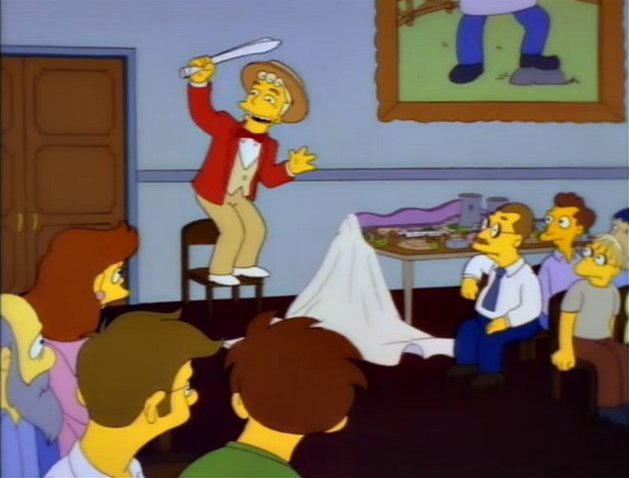
Mike Reiss: It’s such a great feeling that people still love this stuff and that it still holds up 27 years later, but what dawned on me recently is that the gratification is so delayed – with this episode in particular. It was a very tough production. Yeardley Smith [the voice of Lisa Simpson] is on record as saying the cast didn’t like making this episode and the fans weren’t happy with it because, at the time, in the history of The Simpsons, it was weird. It was really far afield from what we’d been doing on the show. It’s nice to be gratified, but it’s so far away from the time when we were doing all the hard work.Rich Moore: Production-wise, the show hadn’t worked out how to achieve these bigger, more spectacular episodes. The writers loved them and the producers loved them. We all loved them. But there were people at the animation studio who were like, “We have to tell them to cut back. These are too complex.” Part of me is thinking, ‘We’re asking for a lot.’ But the artist, or even the kid, in me is thinking, ‘No, these are fucking awesome and we just have to figure out how to do them.’ I always leaned more that way, because I liked the ambitiousness of the episodes and where it took the show. From just a family comedy to these big, overwhelming animated pieces. They were like little movies.Jeff Martin: A funny thing that’s happened since that episode is I’ve heard people say about a con artist or a flim-flam man, “Next thing, he’ll try to sell them a monorail,” which shows The Simpsons’ cultural reach. I always think, ‘Well, that’s not fair. We didn’t come up with that.’ It was a direct, affectionate parody and tribute to The Music Man, but I suppose “monorail salesman” is snappier than “boy’s band organiser”. I think it’s funny that when we’ve parodied something, in some cases it’s supplanted the original idea.Mike Reiss: At the time that we were making the fourth season, Entertainment Weekly magazine came out and said, “The Simpsons is running out of steam. It’s not what it used to be.” It was so depressing, because I was working so hard all year and Entertainment Weekly thought the show was going downhill. It was in a year-end issue, and it ruined my Christmas. As I left on vacation, I read that I’d ruined The Simpsons. Twenty years later, Entertainment Weekly put out an issue that said, “The fourth season is the best season ever. It’s the greatest season of the greatest show in history.” It’s like, ‘Well, I’m glad you like it now!’
LEGACY
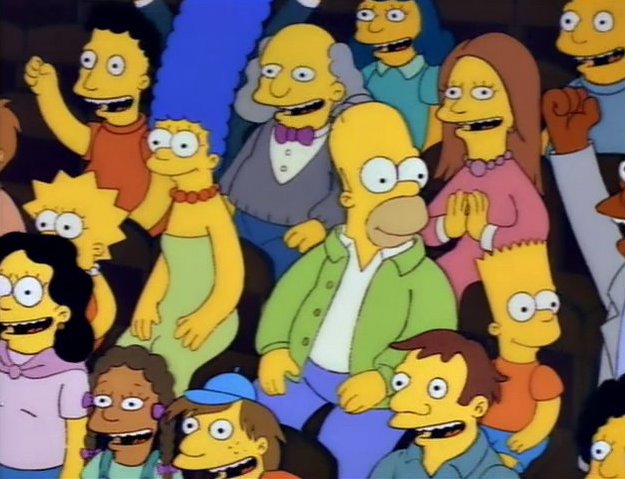
Mike Reiss: Once people got over the shock of it being a departure from what had been the established tone of the show, they could just see it for what it is. It’s just a really funny episode where everything came together. We based it on something good. We had a great script. We had a great director. We brought in Phil Hartman. We had a great guest star. Almost always, when there’s some classic movie or TV show, it’s because all the right bits came together.Jeff Martin: We pushed the envelope and it worked. It had one of the best musical numbers. It’s a good song, and it’s a funny song, and it really gets the plot rolling. The whole third part of the show is a really funny disaster movie parody. There’s probably a higher density of really out-there, absurdist jokes that landed.Rich Moore: I remember thinking, ‘Is this going to be a new thing, where there’s one or two big action episodes per season,’ never thinking that pretty much every episode would eventually become as big as the monorail episode. They got huge within a couple of seasons.David Silverman: I don’t know if it was a dawning realisation or just an organic sense that the more that we expand, and the more that we invest in characters beyond the five Simpsons, the better it was for the show. I think that’s one of the pillars of our success, our longevity. We didn’t just say, “We’re going to focus on these characters,” like you kind of have to do in a sitcom, just for financial reasons. We’re an animation. We can focus on Groundskeeper Willie. We can focus on the Sea Captain. We can focus on Comic Book Guy.Josh Weinstein: If a gun was put to my head, and they said, “Tell me the best episode of television ever,” it’s this. It’s “Marge vs. the Monorail”. At the time it blew people’s minds, in a way, because nothing had been like that until that moment, with the different levels of comedy and everything going on in one episode. I think it was eye-opening for people, including on the staff too, in terms of what could be done on a show. All the original writers, and Sam and Matt and Jim, created this new thing, and this episode is a big step in its evolution.@seanccole